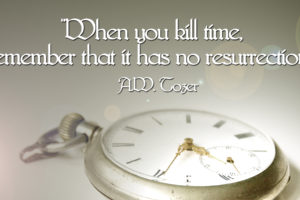To confound Beijing with Paris, or Bogota with Tokyo would appear bizarre to most people, after all, the differences in location and style set them far apart. Nevertheless, when it comes to Christian experiences such mistakes may occur without raising too many eyebrows.
It is generally accepted that the first rule of orientation is to know where we are in relation to a known location—the North Pole being generally the point of reference. If this rule is accepted, a significant number of evangelicals must have lost not only their compass but their map as well, for fantasy is often mistaken for substance and virtuality for reality.
The substance and the shadow
The problem can be traced back to the way material entities usurp the place of their spiritual counterparts. Too often the shadow is being mistaken for the object or the contour for the substance.
This is by no means new. Jesus had to clarify such misconceptions a long time ago. The Samaritan woman for instance was confused about the acceptable place of worship. “Our fathers worship on this mountain, and you Jews say that in Jerusalem is the place where one ought to worship.” This sounds like a modern evangelical debate doesn’t it? Is it here, there, or in both places?
The answer Jesus gave didn’t provide mere information. It reached deep into her spirit and ministered life:
Woman, believe Me, the hour is coming when you will neither on this mountain, nor in Jerusalem worship the Father. … … But the hour is coming, and now is, when the true worshipers will worship the Father in spirit and truth; for the Father is seeking such to worship Him” (John 4:21&23).
This is not empty spiritualizing. It is a call to reality, a reality being recurrently eclipsed by material substitutes or mental simulations.
In the days of Jeremiah the same thing was happening. People thought everything was fine because they were worshiping in the temple (Jer. 7:3–8). In many ways they were the equivalent of traditional churchgoers. They stood in their emblematic sanctuary unaware that the real one was as far from their heart as paradise from their eyes.
The need of discernment
The apostle Paul had to tackle the same problem. Writing to the Colossians he points out that several things are but the shadow of things to come (Col. 2:17). Obviously, some Christians in Colossae were entertaining themselves with umbras while forgetting the substance. Paul had to remind them that the body is of Christ (Col. 2:17). The word he uses for body is σῶμα, which means in the context: That which casts a shadow as distinguished from the shadow itself (see Thayer’s Greek Lexicon). The Orthodox Jewish Bible reads:
Which are a shadow of the things to come in the Olam HaBah; but the reality, the substance, is Moshiach”.
I believe shadows are still confusing several well-intentioned Christians today. The line between appearance and substance is so thin that to discern the one from the other is not always easy, yet the former is lifeless while the latter is life imparting.
For instance, Jesus declares in John 6:63: “The words that I speak to you are spirit, and they are life.” But then Paul draws the line between the mere reflection and the object being reflected: “who also made us sufficient as ministers of the new covenant, not of the letter but of the Spirit; for the letter kills, but the Spirit gives life” (2 Cor. 3:6). It is this existent duality that can engender confusion and lead to what has been called a stagnant Christian life.
Earthly sanctuaries
There are still plenty of earthly sanctuaries surrounding us today. Tabernacles are found on street corners, offering opportunities to enjoy the smell of heaven on the pulse of hymns or rock beat, and this, with the best intentions in mind.
Now please! Don’t misunderstand me. I am not saying such places should not exist. I am only pointing to the deceitful presumption existing in many minds that the temple justifies the experience, which often falls short of spiritual reality. For if clothes don’t make the man and a book should not be judged by its cover, evangelical experiences should not be canonized by the stones of a building or the name of a preacher. But regrettably what should not be done often is, and books are being bought at first glance and religious practices evaluated on their evangelical tint.
The true tabernacle
“Now this is the main point of the things we are saying: We have such a High Priest, who is seated at the right hand of the throne of the Majesty in the heavens, a Minister of the sanctuary and of the true tabernacle which the Lord erected, and not man” (Hebrews 8:1,2).
This is the tabernacle justifying the experience, the true and eternal sanctuary where spiritual reality strikes the mind and enlightens the heart. Therein stand the seraphim with their faces covered with two wings, one crying to another saying: “Holy, holy, holy is the Lord of hosts; the whole earth is full of His glory!” (Isaiah 6:3). In that temple there is no grumbling, no backbiting and no arrogance. There is only reverence and everyone says: “Glory!” (Psalm 29:9).
When we cavil or belch out resentment, when we utter falsehood or scoff at our neighbor we are not in His temple. We might be inside an earthly sanctuary amidst hymns and prayers, but surely we haven’t crossed the everlasting doors. Maybe the woman next to us has crossed them; maybe she is beholding the throne of glory. If she does you can be certain her life is experiencing a transformation. She is being changed into the same image from glory to glory even as by the Spirit of the Lord (2 Cor. 3:18). But are we?
Why do we run after earthly goods so much? How is it that the consumption society has succeeded in hypnotizing such a large sector of our evangelical world? Maybe the old song has the answer:
Turn your eyes upon Jesus, look full in His wonderful face, and the things of the earth will grow strangely dim in the light of His glory and grace.”
If these words mean anything at all, much of His glory must be hidden from many evangelical worshipers, for what is being observed provokes the question: Where are we standing? Can we say with Jeremiah: “A glorious high throne from the beginning is the place of our sanctuary” (Jeremiah 17:12).
Psalm seventy-three
I believe there is something of great importance to be learned in Psalm seventy-three. The psalmist narrates how he was envious of the boastful when he saw the prosperity of the wicked. His heart was full of questions and doubts. What he observed disturbed him. He was soaked in frustration and exasperation. But suddenly we see him waking up. His meditation is abruptly transfigured. The veil of deceitful appearance is lifted up and truth appears in all of its glory.
How did it happen? Verse seventeen explains how: He went into the sanctuary of God. This made the difference. Amidst angelic hosts and rays of divine light he reached the place of understanding. The question of Job had finally been answered: “But where can wisdom be found? And where is the place of understanding?” (Job 28:12 & 20). At last the psalmist knew, and knew with certainty, where the place of understanding was. One single entrance into the Ancient Tabernacle was sufficient to captivate his entire being and enlighten the eyes of his understanding.
Where the light shines forth
Isaiah experienced the same thing. Inside the heavenly temple his life underwent a restoration. There was a sudden change at the level of the mind. He could now discern between the profane and the holy, between the clean and the unclean. At once he realized he was unfit for the Master’s use:
Woe is me, for I am undone; because I am a man of unclean lips, and I dwell in the midst of a people of unclean lips: for my eyes have seen the King, the LORD of hosts” (Isaiah 6:3).
Inside these gates virtuality cannot breathe. All shams are laid bare and smashed on the floor of factuality. The conscience is shaken and the thoughts exposed.
What I am saying is that nothing has changed. The place of understanding still exists and we can enter and dwell there.
A biblical invitation
Brethren! Let us not be at ease in Zion (Amos 6:1). Let us strengthen the hands which hang down, and the feeble knees (Isaiah 35:3; Hebrews 12:12). “Let us draw near with a true heart in full assurance of faith, having our hearts sprinkled from an evil conscience and our bodies washed with pure water. Let us hold fast the confession of our hope without wavering, for He who promised is faithful. And let us consider one another in order to stir up love and good works, not forsaking the assembling of ourselves together, as is the manner of some, but exhorting one another, and so much the more as you see the Day approaching” (Hebrews 10:22–25).
If you think this post can help somebody you can share it with the options presented bellow.













